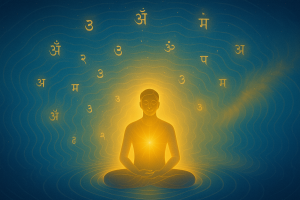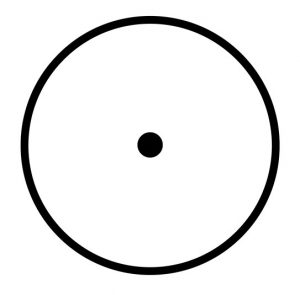Editor: Jeffrey Carr
by GURURAJ ANANDA YOGI
Editor: In this beautiful satsang, Gururaj is teaching us about the trouble we get into by adding our judgments and interpretations onto the direct perception of a situation or object or person. We add our prejudges, beliefs and selfish desires onto the world of our perceptions-‐ which Gururaj reminds is beautiful, complete and perfect just as it is, if we would simply see it so. We miss the totality of our experience when we add our own limited interpretations. This is the kind of thing that we might think we already understand, until we realize how often we are unable to see the kind of wholeness and totality he is talking about. A great classic of the Zen tradition says,
The Great Way is not difficult
For those who have no preferences.
When Love and hate are both absent Everything becomes clear and undisguised.
Make the smallest distinction, however,
And heaven and earth are set infinitely apart…
Question: What is the difference between the object of interpretation, the essence of the interpretation, and the role of the interpreter?
GURURAJ ANANDA YOGI: The object that you want to interpret is something perceived by your mind, and the mind always compares the object of its perception with the inner self, or the sub-‐conscious. For example, that is a jug over there. How do you know it is a jug? You are interpreting it to be a jug. For that perception, you require the inner mind that has known of jugs. You interpret that jug according to the impressions you have within you.
Now, this jug will look different to different people, depending upon what angle you are looking at it. Yet it is the same jug. Someone sitting over there will see the handle. Our beloved friend sitting over there will see the spout. You sitting over here will see the center.
So all interpretations are based upon the angle of your vision, and there are very few in this world that can look at it in totality, who at the same time can see the handle, the spout and the center. You can interpret that jug as either half full or half empty. But it is both, is it not? Lift up the jug, and you’ll see. It is both half full and half empty. It depends upon where the emphasis is put, on the half-‐fullness or the half-‐emptiness. That is the interpretation, in which the object you perceive makes you interpret it (according to your point of view).
That is why people in the world don’t look at things in the same way. Someone might be the most beautiful woman in the world to me, and yet to John or Jack she might seem just ordinary. To be a true interpreter is to see the totality. To find any defect in a person as still beautiful, that is because you are looking at it in its totality. Take one of Tamaji’s paintings, for example. If you look at just one little section of that painting, and blot out the rest, the painting will make no sense. But if you look at the whole painting, then it makes sense to you as a painting. Likewise, the role of the interpreter is to see the fullness, the wholeness, and the totality of all that exists.
To be able to see the totality of all that exists around you, you require one prime quality. And that is the ability to see within you, because “insight” is totally related to “outsight”. Without insight you can never perceive the outsight. So, the inside is just as important as that which is outside. By finding the reality that is inside of you, you will find the reality of everything that is outside of you. The combination of the two forms the totality. The inside and the outside combined brings about an insight into reality. That is the role of the interpreter of truth. He shows you how to develop that insight. And when you develop that insight, life becomes joyous because you see things as a total wholeness. There is no differentiation, there is no qualifications, no discrimination, and everything becomes totally beautiful. Isn’t that what everyone wants to see? Everyone wants to see beauty. But the art is to see beauty in that which might first seem to be ugly to you. There is nothing in this world that is ugly. It is all beauty and nothing else but beauty. When you see all that surrounds you to be beautiful, how much more enjoyable life becomes! When life becomes more joyful and filled with joy, there is no place for any suffering or misery.
We say that Divinity is omnipresent. But if He is omnipresent, then where is there any place for ugliness? Divinity is beautiful. It is our interpretations of the object being interpreted that makes us see things in a different way. If you take a clear crystal and if you put a red flower behind it, the crystal will seem red. If you put a blue flower behind that clear crystal, the crystal will seem blue. Or if you put a yellow flower, the crystal will seem yellow. But the crystal has not changed. The crystal remains that crystal, completely clear. What changes it are the patternings of your mind, your thought forces that have created this condition.
I know one lady, a very beautiful mediator, who loved a man. Although she was beautiful, this man started to find faults with her. He would say things like, “Oh, she’s sloppy” and she’s this and that. And yet she was such a beautiful, pure soul, not only inside but on the exterior as well. Yet this man finds faults: she’s sloppy, she’s this or that. Is she sloppy or is he who is sloppy? That’s only his interpretation of sloppiness. I wouldn’t mind my wife, for example, to walk around the house in baggy pants doing the housework. What’s so sloppy about that?
It’s more comfortable for her, and while looking after the house and the kids she can achieve more by being comfortable. You know, a housewife’s work is never done, as they say. I don’t know how true it is. So the sloppiness is in the man’s mind, and the sloppiness in the man’s mind is because he has preconceptions. For example, I wouldn’t want my wife to walk around elegantly dressed in a beautiful gown of the sort that you might wear when you go to some big function. How is she going to do her work if she has to wear a gown and be elegant all the time? She sometimes needs those baggy pants or a loose skirt, to make her feel comfortable so that she can do her work. So, it is a matter of interpretation, and that interpretation is based on preconceptions. People’s minds, being patterned, have preconceptions. And they want everything around them to fit in with their conceptions. And what are their conceptions based upon? Nothing but falsity. These conceptions are based upon falsity because people do not know reality. So if my wife is walking around in baggy pants vacuuming the floor, my conception should not be on her baggy pants. Why should I concentrate on her baggy pants? I must concentrate on her, I must pour my mind to her and the love I have for her. That is where my attention should be, and not on her baggy pants. Because I know when we go to bed she won’t have the baggy pants on!
So that is the basis of interpretation. Let’s say that she goes to the hairdresser for a new hairdo. Why must I say, “I don’t like your new hairdo.” Why must I say that? She has had her hair done because she liked it. And she must have the right to like the style she wants her hair to be done in. Why shouldn’t she have that freedom? Why should she do her hair according to my conceptions; that you’ve got to have this down here or that up there? These are just preconceptions! And preconceptions are the basis of your interpretation of everything in life. So when you do not have preconceptions and live in the moment of conception itself, then you appreciate everything. Then the interpretation is gone; it disappears. It’s like the hairdo of my beloved; it’s beautiful if she likes it. And if I love her, then I must like it too. So simple! So how do we get away from interpretations? And how do we get away from preconceptions? That is the question. It’s a sixty-‐four thousand dollar question. A son went to his father and said, “Dad, I want to ask you a sixty-‐four thousand dollar question.” So the dad says, “Yes, by all means.” So the son says, “Can you lend me sixty-‐four thousand dollars?”
The way to get rid of preconceptions is to be totally unbiased. Now what to we mean by unbiased? To be unbiased is to have a totally open mind. When you have a totally open mind, then you become accepting. And when you accept a situation, whatever it might be, then you do not interpret but you accept it. And that’s the role of the interpreter of truth, to teach, “just accept.” If these lights here are too bright and hurting my eyes, I accept it. What’s wrong with it? Let it hurt! I will close my eyes for two minutes time, and it will all be gone. I accept it. This is just a little example. But this applies to everything in life. People complain about their jobs. Ninety-‐nine percent of people do not like their jobs. Ninety-‐nine percent of people would like to sock the boss in the nose. But it’s not a matter of liking your job; it is a matter of accepting your job. And then, perhaps, if you can find something better, why not take it? But do not be disappointed at that moment while you are doing a particular job.
And when you accept whatever you are doing, you can also accept whatever is done to you gracefully, without any hurt. By having that attitude of mind, you are not hurt. And when you are not hurt, you are happy. So an unbiased, open mind and an acceptance of the situation or position, will take you away from interpretation. Because everyone interprets things differently, it is up to every individual to accept these general principles. There comes acceptance again. To accept these general principles which do not hurt you or make life miserable.
Interpretation, interpretation, interpretation! If you enter deeply into the “inter” in the word “interpretation,” then we can change the word from “interpretation” to “interpenetration”-‐-‐ or even into “interpretension.” That’s even better! Someone must write a dictionary for all of the new words I am inventing! It is this “interpretension” that we have within ourselves that makes us interpret things wrongly. So let’s say that this lady meditator has a boyfriend who finds so much fault in her. OK. And if he carries on and on, she will stick it out as long as she can—until she finally chucks him and finds another boyfriend, because he’s not the only man in the world! And if he were the only man in the world, she still would not marry him! Do you see? So that is the role of the interpreter-‐-‐to show the way, but never to interpret anything until you have developed a comprehensive view, until you can look at the situation from this side and that side and the top and the bottom at the same time. And when you can do that, then the question of interpretation just disappears. You see the wholeness. Many of the problems of life lie in the interpretation, because we are always interpreting things. And interpretation naturally involves analysis, and when there is analysis, there is no acceptance. You might say that this floral arrangement is not nice. That’s your interpretation. Or you could say, “Ah, what a beautiful arrangement.” Now, everyone possesses a universal mind, and through meditation and spiritual practices we reach the universality of the mind, which is one mind only. Then everyone will see this floral arrangement as it is, and not according to our individual mind, which is forever interpreting things. That is the role of the interpreter, to make you see things comprehensively. And when you can see things comprehensively, then, at the same time, you will see the essence of the thing. As with this floral arrangement, you see the white flowers and the green leaves and what have you. But how many of us can really see the energy within them, the invisible sap or the energy that keeps these flowers alive? To have that comprehensive view means that you do not only see the white flowers and the green leaves, but you also see the essence or the sap that keeps it alive.
We can start learning to do this when we develop that insight inside ourselves through spiritual practices. That is why a teacher, a true spiritual master, comes to assist you to develop that inner sense. You “know”, and you have “sense”. Then you have “common sense”. And finally, you have “nonsense”. Which is the best of the three? Nonsense. That’s right! Sense is when you exercise your little conscious mind. And as I’ve said in many talks, you have twelve billion cells up there and you are only using one-‐millionth part of them. And that constitutes what you think of as “sense.” And then you add onto it, to make “sensible.” So are you really able to have “sense”? And we go on to a “common sense”, which is really not all that common. But then we reach that area of nonsense! In my dictionary, nonsense does not mean that you’ve got no brains. Nonsense means to take away the workings of the conscious mind, to take away that “sense” and become “non”, by not using the analytical interpretation of things. Do you see?






